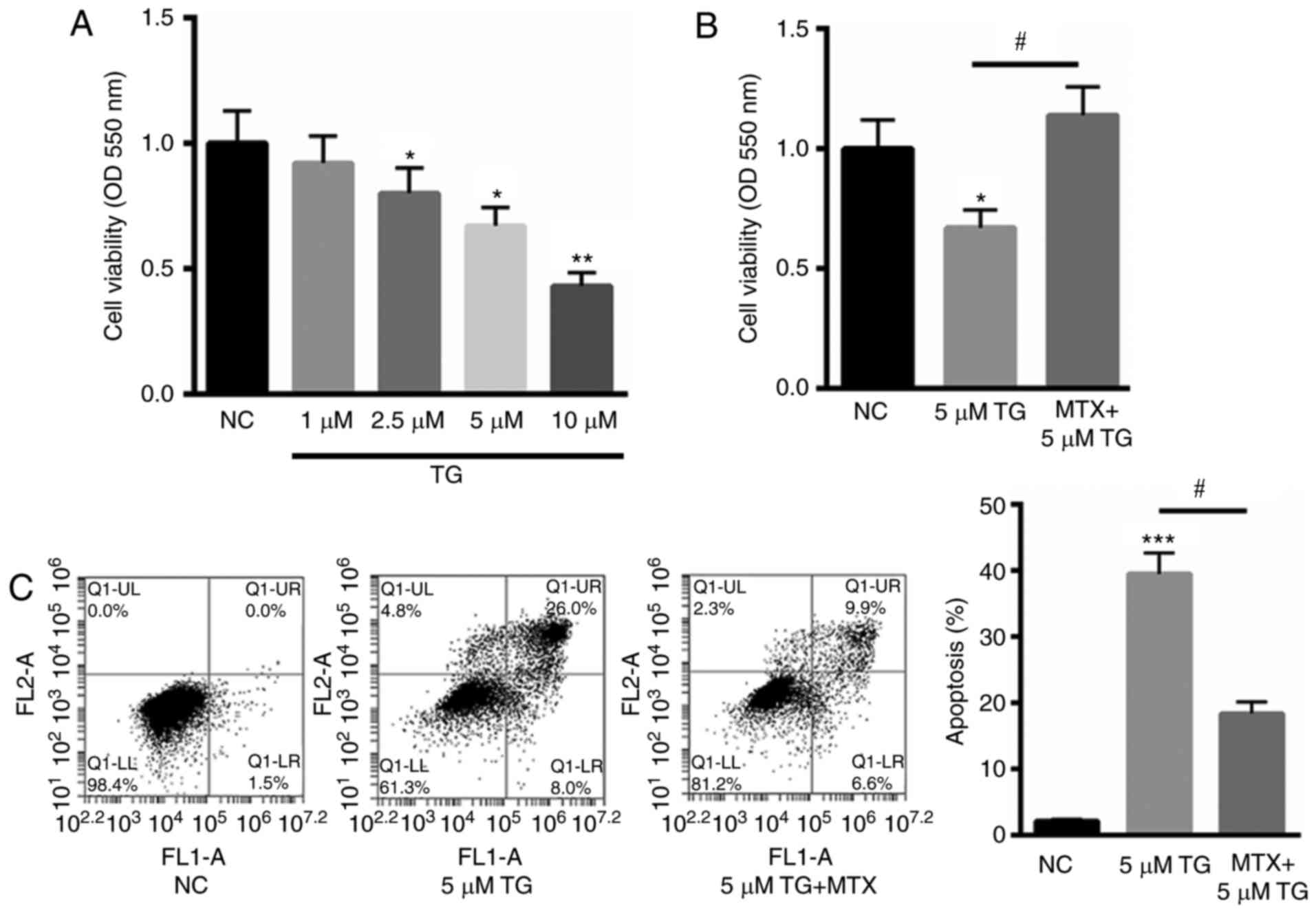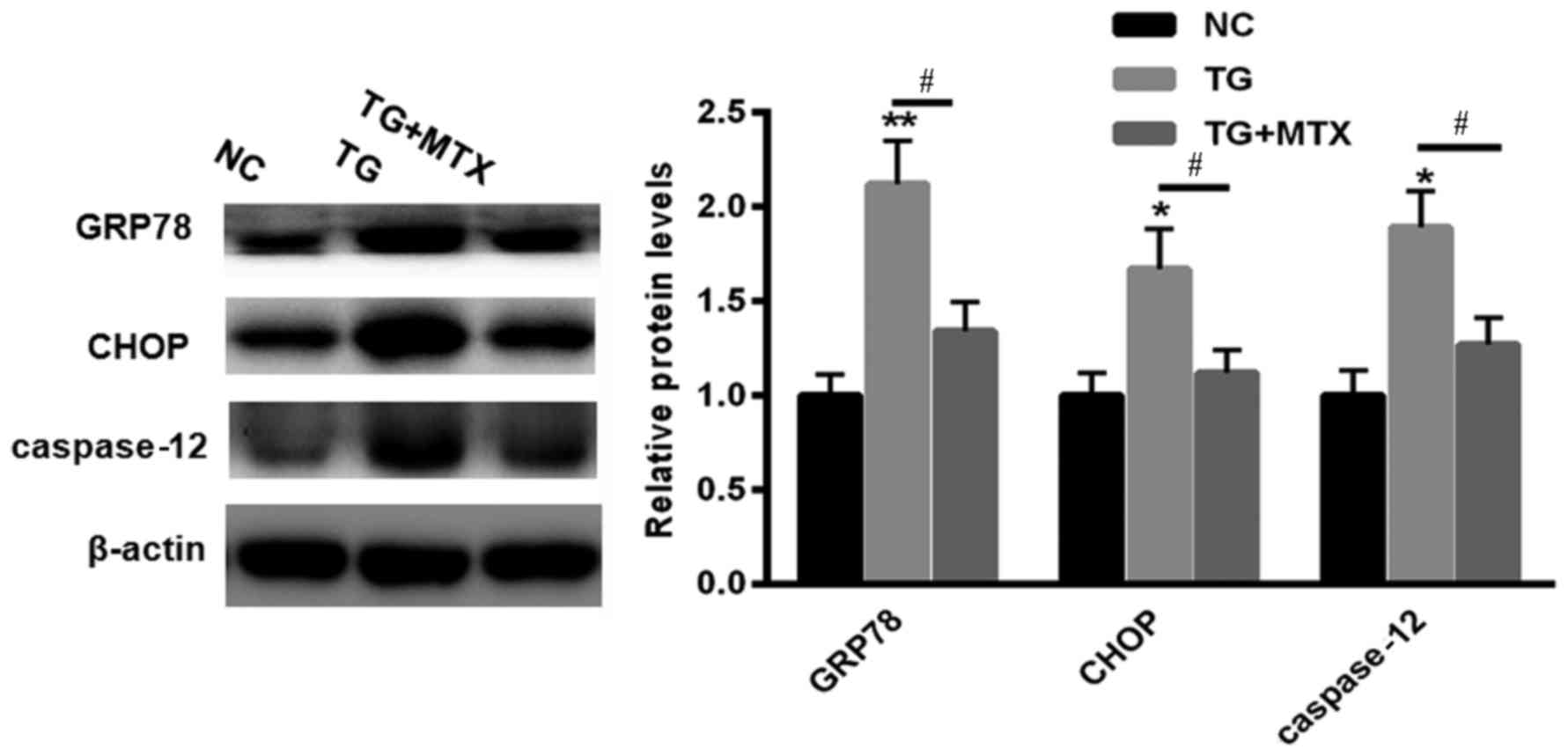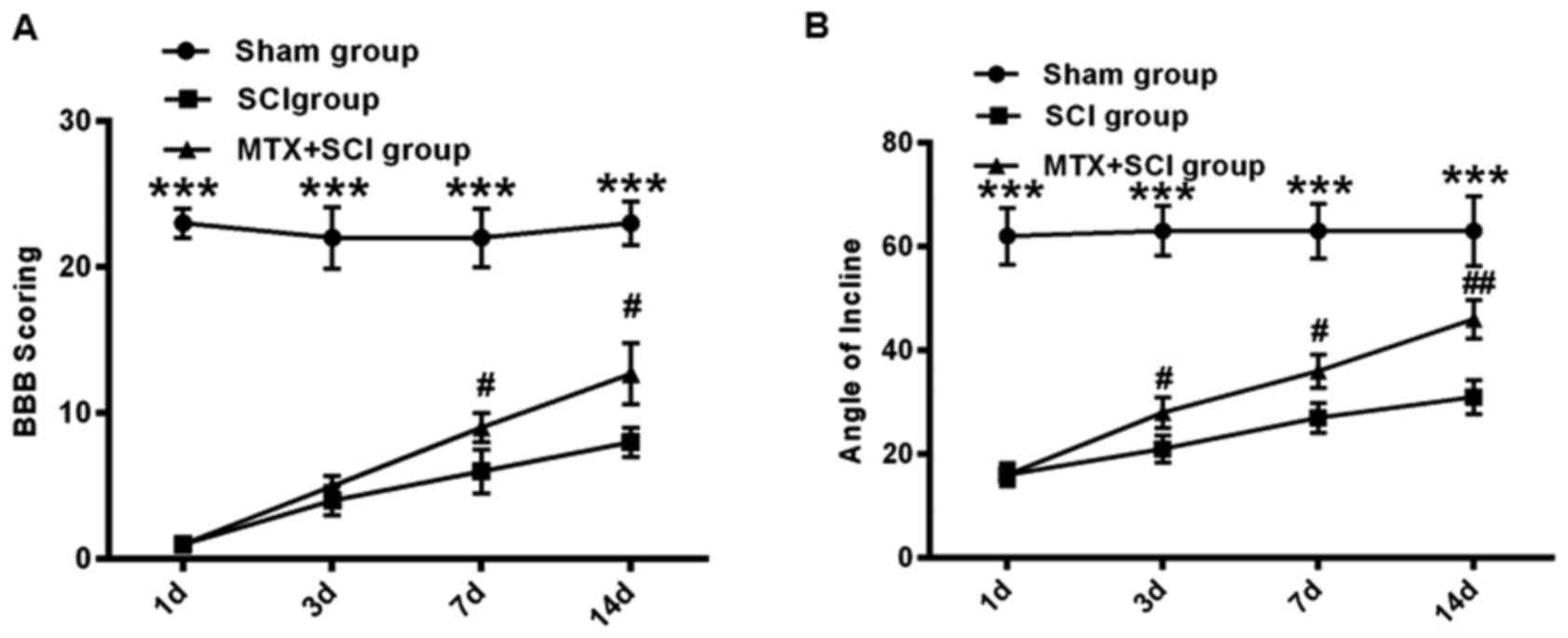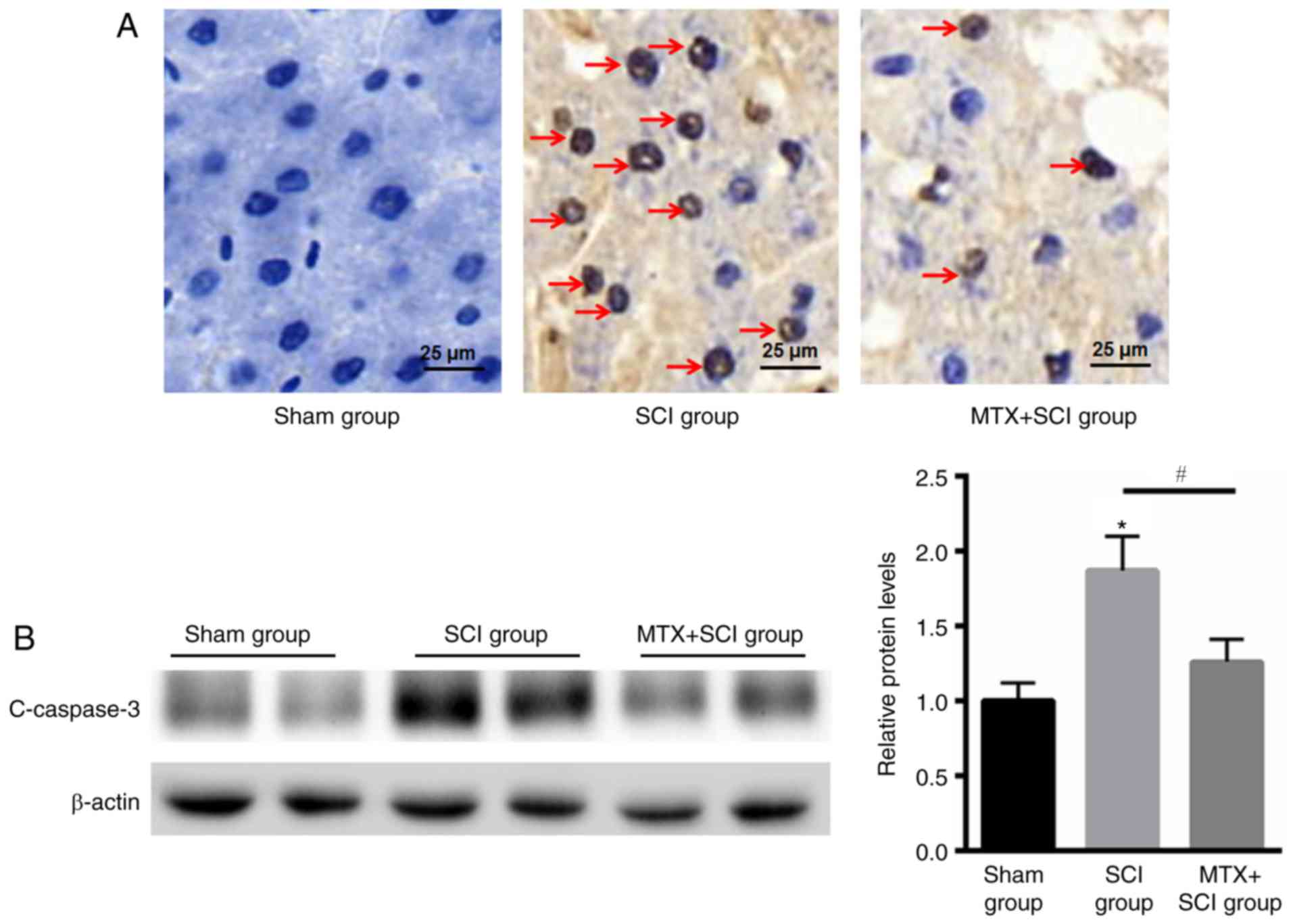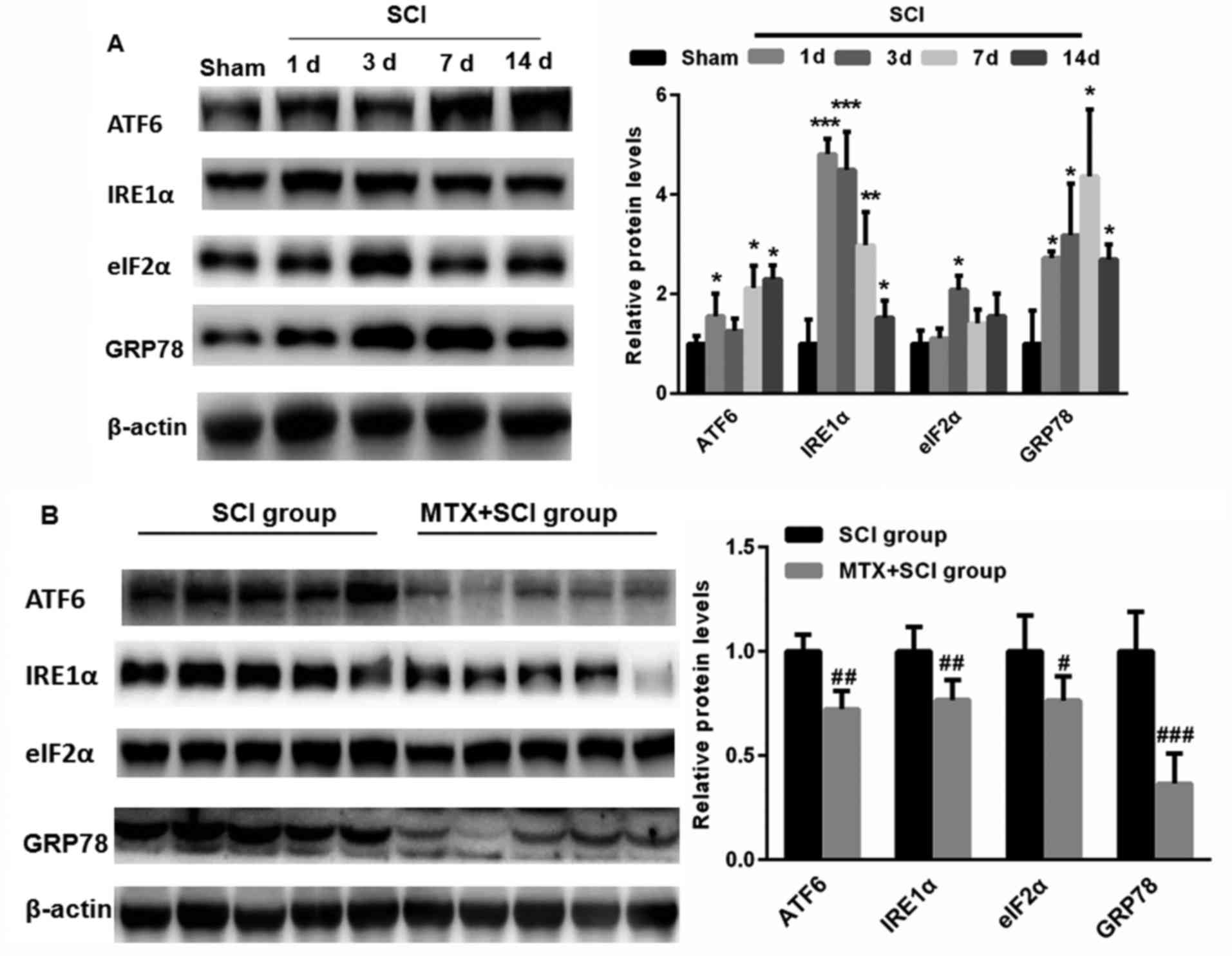|
1
|
Motiei-Langroudi R and Sadeghian H:
Traumatic spinal cord injury: Long-term motor, sensory, and urinary
outcomes. Asian Spine J. 11:412–418. 2017. View Article : Google Scholar : PubMed/NCBI
|
|
2
|
Shank CD, Walters BC and Hadley MN:
Management of acute traumatic spinal cord injuries. Handb Clin
Neurol. 140:275–298. 2017. View Article : Google Scholar : PubMed/NCBI
|
|
3
|
Chen Y, Tang Y, Allen V and DeVivo MJ:
Aging and spinal cord injury: External causes of injury and
implications for prevention. Top Spinal Cord Inj Rehabil.
21:218–226. 2015. View Article : Google Scholar : PubMed/NCBI
|
|
4
|
Lee JY, Maeng S, Kang SR, Choi HY, Oh TH,
Ju BG and Yune TY: Valproic acid protects motor neuron death by
inhibiting oxidative stress and endoplasmic reticulum
stress-mediated cytochrome C release after spinal cord injury. J
Neurotrauma. 31:582–594. 2014. View Article : Google Scholar : PubMed/NCBI
|
|
5
|
Liu X, Yang J, Li Z, Liang F, Wang Y, Su Q
and Li C: Hyperbaric oxygen treatment protects against spinal cord
injury by inhibiting endoplasmic reticulum stress in rats. Spine
(Phila Pa 1976). 40:E1276–E1283. 2015. View Article : Google Scholar : PubMed/NCBI
|
|
6
|
Matsuyama D, Watanabe M, Suyama K, Kuroiwa
M and Mochida J: Endoplasmic reticulum stress response in the rat
contusive spinal cord injury model-susceptibility in specific cell
types. Spinal Cord. 52:9–16. 2014. View Article : Google Scholar : PubMed/NCBI
|
|
7
|
Ohri SS, Maddie MA, Zhang Y, Shields CB,
Hetman M and Whittemore SR: Deletion of the pro-apoptotic
endoplasmic reticulum stress response effector CHOP does not result
in improved locomotor function after severe contusive spinal cord
injury. J Neurotrauma. 29:579–588. 2012. View Article : Google Scholar : PubMed/NCBI
|
|
8
|
Wang ZL, Zhou ZG, Chen Y, Li XT and Sun
YS: Support vector machines model of computed tomography for
assessing lymph node metastasis in esophageal cancer with
neoadjuvant chemotherapy. J Comput Assist Tomogr. 41:455–460. 2017.
View Article : Google Scholar : PubMed/NCBI
|
|
9
|
Ohri SS, Maddie MA, Zhao Y, Qiu MS, Hetman
M and Whittemore SR: Attenuating the endoplasmic reticulum stress
response improves functional recovery after spinal cord injury.
Glia. 59:1489–1502. 2011. View Article : Google Scholar : PubMed/NCBI
|
|
10
|
Ohri SS, Mullins A, Hetman M and
Whittemore SR: Inhibition of GADD34, the stress-inducible
regulatory subunit of the endoplasmic reticulum stress response,
does not enhance functional recovery after spinal cord injury. PLoS
One. 9:e1097032014. View Article : Google Scholar : PubMed/NCBI
|
|
11
|
Penas C, Guzmán MS, Verdú E, Forés J,
Navarro X and Casas C: Spinal cord injury induces endoplasmic
reticulum stress with different cell-type dependent response. J
Neurochem. 102:1242–1255. 2007. View Article : Google Scholar : PubMed/NCBI
|
|
12
|
Tka Hadj Ayed K, Boussaid Mahfoudh A,
Zaouali MA, Kammoun R, Bejaoui M, Ghoul Mazgar S, Catafau Rosello J
and Ben Abdennebi H: Melatonin modulates endoplasmic reticulum
stress and Akt/GSK3-beta signaling pathway in a rat model of renal
warm ischemia reperfusion. Anal Cell Pathol (Amst).
2015:6351722015.PubMed/NCBI
|
|
13
|
Halliday M and Mallucci GR: Review:
Modulating the unfolded protein response to prevent
neurodegeneration and enhance memory. Neuropathol Appl Neurobiol.
41:414–427. 2015. View Article : Google Scholar : PubMed/NCBI
|
|
14
|
Ben Mosbah I, Alfany-Fernández I, Martel
C, Zaouali MA, Bintanel-Morcillo M, Rimola A, Rodés J, Brenner C,
Roselló-Catafau J and Peralta C: Endoplasmic reticulum stress
inhibition protects steatotic and non-steatotic livers in partial
hepatectomy under ischemia-reperfusion. Cell Death Dis. 1:e522010.
View Article : Google Scholar : PubMed/NCBI
|
|
15
|
Yang X, Shao H, Liu W, Gu W, Shu X, Mo Y,
Chen X, Zhang Q and Jiang M: Endoplasmic reticulum stress and
oxidative stress are involved in ZnO nanoparticle-induced
hepatotoxicity. Toxicol Lett. 234:40–49. 2015. View Article : Google Scholar : PubMed/NCBI
|
|
16
|
Curtis JR, Wright GC, Strand V, Davis CS,
Hitraya E and Sasso EH: Reanalysis of the multi-biomarker disease
activity score for assessing disease activity in the abatacept
versus adalimumab comparison in biologic-naive rheumatoid arthritis
subjects with background methotrexate study: Comment on the Article
by Fleischmann et al. Arthritis Rheumatol. 69:863–865. 2017.
View Article : Google Scholar : PubMed/NCBI
|
|
17
|
Fleischmann R, Mease PJ, Schwartzman S,
Hwang LJ, Soma K, Connell CA, Takiya L and Bananis E: Efficacy of
tofacitinib in patients with rheumatoid arthritis stratified by
background methotrexate dose group. Clin Rheumatol. 36:15–24. 2017.
View Article : Google Scholar : PubMed/NCBI
|
|
18
|
Ito Y, Hozumi K, Okada Y and Kurimoto S:
Adalimumab with methotrexate in treatment-naive Japanese patients
with rheumatoid arthritis at risk of progressive structural joint
damage: A postmarketing observational study. Rheumatol Ther.
4:151–166. 2017. View Article : Google Scholar : PubMed/NCBI
|
|
19
|
Chen H, Li J, Liang S, Lin B, Peng Q, Zhao
P, Cui J and Rao Y: Effect of hypoxia-inducible factor-1/vascular
endothelial growth factor signaling pathway on spinal cord injury
in rats. Exp Ther Med. 13:861–866. 2017. View Article : Google Scholar : PubMed/NCBI
|
|
20
|
Vachon P, Faubert S, Blais D, Comtois A
and Bienvenu JG: A pathophysiological study of abdominal organs
following intraperitoneal injections of chloral hydrate in rats:
comparison between two anaesthesia protocols. Lab Anim. 34:84–90.
2000. View Article : Google Scholar : PubMed/NCBI
|
|
21
|
Nakase Y, Hagiwara A, Kin S, Fukuda K, Ito
T, Takagi T, Fujiyama J, Sakakura C, Otsuji E and Yamagishi H:
Intratumoral administration of methotrexate bound to activated
carbon particles: Antitumor effectiveness against human colon
carcinoma xenografts and acute toxicity in mice. J Pharmacol Exp
Ther. 311:382–387. 2004. View Article : Google Scholar : PubMed/NCBI
|
|
22
|
Thuret S, Moon LD and Gage FH: Therapeutic
interventions after spinal cord injury. Nat Rev Neurosci.
7:628–643. 2006. View
Article : Google Scholar : PubMed/NCBI
|
|
23
|
Rivlin AS and Tator CH: Objective clinical
assessment of motor function after experimental spinal cord injury
in the rat. J Neurosurg. 47:577–581. 1977. View Article : Google Scholar : PubMed/NCBI
|
|
24
|
Qiao Y, Peng C, Li J, Wu D and Wang X:
Spinal cord ischemia-reperfusion causes damage of neurocyte by
inhibiting RAP2C. Neurol Res. 39:877–884. 2017. View Article : Google Scholar : PubMed/NCBI
|
|
25
|
Tian R and Shi R: Dimercaprol is an
acrolein scavenger that mitigates acrolein-mediated PC-12 cells
toxicity and reduces acrolein in rat following spinal cord injury.
J Neurochem. 141:708–720. 2017. View Article : Google Scholar : PubMed/NCBI
|
|
26
|
Lee DH, Seubert S, Huhn K, Brecht L,
Rötger C, Waschbisch A, Schlachetzki J, Klausmeyer A, Melms A,
Wiese S, et al: Fingolimod effects in neuroinflammation: Regulation
of astroglial glutamate transporters? PLoS One. 12:e01715522017.
View Article : Google Scholar : PubMed/NCBI
|
|
27
|
Xia Y, Xia H, Chen D, Liao Z and Yan Y:
Mechanisms of autophagy and apoptosis mediated by JAK2 signaling
pathway after spinal cord injury of rats. Exp Ther Med.
14:1589–1593. 2017. View Article : Google Scholar : PubMed/NCBI
|
|
28
|
Park JH, Im SA, Byun JM, Kim KH, Kim JS,
Choi IS, Kim HJ, Lee KH, Kim TY, Han SW, et al: Cyclophosphamide,
methotrexate and 5-fluorouracil as palliative treatment for heavily
pretreated patients with metastatic breast cancer: A multicenter
retrospective analysis. J Breast Cancer. 20:347–355. 2017.
View Article : Google Scholar : PubMed/NCBI
|
|
29
|
Fekry B, Esmaeilniakooshkghazi A, Krupenko
SA and Krupenko NI: Ceramide synthase 6 is a novel target of
methotrexate mediating its antiproliferative effect in a
p53-dependent manner. PLoS One. 11:e01466182016. View Article : Google Scholar : PubMed/NCBI
|
|
30
|
Giordano L, Akinyede O, Bhatt N, Dighe D
and Iqbal A: Methotrexate-induced neurotoxicity in hispanic
adolescents with high-risk acute leukemia-a case series. J Adolesc
Young Adult Oncol. 6:494–498. 2017.PubMed/NCBI
|
|
31
|
Bohme D, Krieghoff J and Beck-Sickinger
AG: Double methotrexate-modified neuropeptide Y analogues express
increased toxicity and overcome drug resistance in breast cancer
cells. J Med Chem. 59:3409–3417. 2016. View Article : Google Scholar : PubMed/NCBI
|
|
32
|
Kuznetsov JN, Leclerc GJ, Leclerc GM and
Barredo JC: AMPK and Akt determine apoptotic cell death following
perturbations of one-carbon metabolism by regulating ER stress in
acute lymphoblastic leukemia. Mol Cancer Ther. 10:437–447. 2011.
View Article : Google Scholar : PubMed/NCBI
|
|
33
|
Chen H, Yan L, Wang J, Sun Y, Li X, Zhao
S, Wang D, Zhu G and Liang Y: Methotrexate prevents epidural
fibrosis through endoplasmic reticulum stress signalling pathway.
Eur J Pharmacol. 796:131–138. 2017. View Article : Google Scholar : PubMed/NCBI
|
|
34
|
Sharma S, Sarkar J, Haldar C and Sinha S:
Melatonin reverses fas, E2F-1 and endoplasmic reticulum stress
mediated apoptosis and dysregulation of autophagy induced by the
herbicide atrazine in murine splenocytes. PLoS One. 9:e1086022014.
View Article : Google Scholar : PubMed/NCBI
|
|
35
|
Tuñón MJ, San-Miguel B, Crespo I, Laliena
A, Vallejo D, Álvarez M, Prieto J and González-Gallego J: Melatonin
treatment reduces endoplasmic reticulum stress and modulates the
unfolded protein response in rabbits with lethal fulminant
hepatitis of viral origin. J Pineal Res. 55:221–228. 2013.
View Article : Google Scholar : PubMed/NCBI
|
|
36
|
Sui T, Ge DW, Yang L, Tang J, Cao XJ and
Ge YB: Mitomycin C induces apoptosis in human epidural scar
fibroblasts after surgical decompression for spinal cord injury.
Neural Regen Res. 12:644–653. 2017. View Article : Google Scholar : PubMed/NCBI
|
|
37
|
He Z, Zhou Y, Huang Y, Wang Q, Zheng B,
Zhang H, Li J, Liu Y, Wu F, Zhang X, et al: Dl-3-n-butylphthalide
improves functional recovery in rats with spinal cord injury by
inhibiting endoplasmic reticulum stress-induced apoptosis. Am J
Transl Res. 9:1075–1087. 2017.PubMed/NCBI
|
|
38
|
Pei JP, Fan LH, Nan K, Li J, Dang XQ and
Wang KZ: HSYA alleviates secondary neuronal death through
attenuating oxidative stress, inflammatory response, and neural
apoptosis in SD rat spinal cord compression injury. J
Neuroinflammation. 14:972017. View Article : Google Scholar : PubMed/NCBI
|
|
39
|
Wang C, Shi D, Song X, Chen Y, Wang L and
Zhang X: Calpain inhibitor attenuates ER stress-induced apoptosis
in injured spinal cord after bone mesenchymal stem cells
transplantation. Neurochem Int. 97:15–25. 2016. View Article : Google Scholar : PubMed/NCBI
|
|
40
|
Xue Q, Li C, Chen J, Guo H, Li D and Wu X:
The protective effect of the endoplasmic reticulum stress-related
factors BiP/GRP78 and CHOP/Gadd153 on noise-induced hearing loss in
guinea pigs. Noise Health. 18:247–255. 2016. View Article : Google Scholar : PubMed/NCBI
|
|
41
|
Zhu SP, Wang ZG, Zhao YZ, Wu J, Shi HX, Ye
LB, Wu FZ, Cheng Y, Zhang HY, He S, et al: Gelatin nanostructured
lipid carriers incorporating nerve growth factor inhibit
endoplasmic reticulum stress-induced apoptosis and improve recovery
in spinal cord injury. Mol Neurobiol. 53:4375–4386. 2016.
View Article : Google Scholar : PubMed/NCBI
|
|
42
|
Feng J, Chen X and Sun X, Wang F and Sun
X: Expression of endoplasmic reticulum stress markers GRP78 and
CHOP induced by oxidative stress in blue light-mediated damage of
A2E-containing retinal pigment epithelium cells. Ophthalmic Res.
52:224–233. 2014. View Article : Google Scholar : PubMed/NCBI
|















